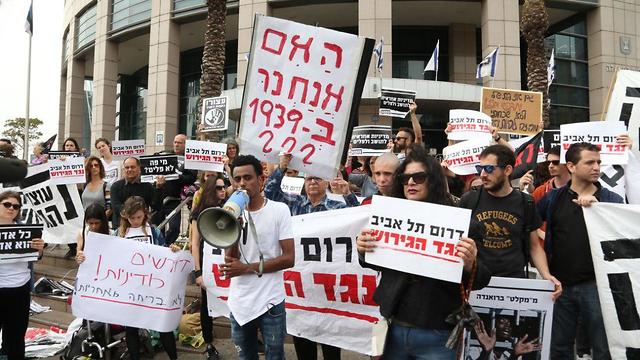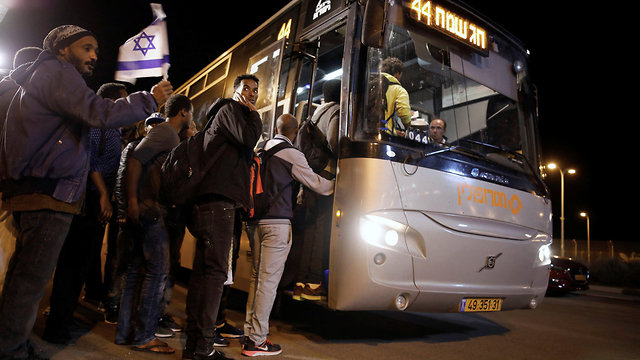
Israel paid African country last month to take in illegal migrants
Ynet learns that one month before Netanyahu accepted UN plan intended to resolve migrant crisis, before abandoning it and yet again pledging to deport thousands of Sudanese and Eritreans, Israel already completed at least part of the quid pro quo deal with an African 'third country' for its expulsion plan.
It remains unclear whether or not the deal was fully completed or is expected to continue in the coming weeks and months, but it is intended to lead to an agreement by the same African country to act as what has been commonly described as the “third country” in the deportation plan.
The financial handout stage of the surreptitious deal took place one month before Prime Minister Benjamin Netanyahu declared his intention to scrap the deportation plan, and replace it with a United Nations (UN) deal that dismayed even many advocates of the plan, only to suspend it and then completely abandon it it in rapid succession.
According to a report by the Population and Immigration Authority concluding 2017, there are 34,187 asylum seekers from Sudan and Eritrea in Israel.
As part of the UN deal, the UN High Commission was planning to work to reach agreements with different Western countries to take in at least 16,250 of the migrants, which Israel says are economic migrants.
Within a year and a half, the first 6,000 asylum seekers were to leave for Western countries, and within five years the remaining 10,250 were supposed to leave Israel.
Angering many, Israel, in turn, would have granted legal status to protected populations among the asylum seekers, some 18,000 refugees who would have remained in the country regardless.
The UN refugee agency was quick to express "disappointment" over Netanyahu's decision to reverse course.
Since retracting his consent to the deal however, Netanyahu declared that despite the legal difficulties involved in removing the migrants, the majority of whom live in south Tel Aviv, the state would find a way to deport them.
“Despite the growing legal restrictions and international difficulties, we will continue to act with determination to exhaust all options at our disposal and to remove the infiltrators,” Netanyahu declared after his U-turn.
Scrambling for a solution after Rwanda, which was widely believed to have been one of the original third countries that had agreed to take in the migrants and then reneged on the deal, Netanyahu dispatched a special envoy to Uganda, referred to as the "third country", to establish whether a deal Israel had signed with it on the matter remained valid.
On Thursday, the state told the High Court of Justice (HCJ) that there is a high probability that a "third country", Uganda, will accept illegal African migrants deported by Israel, just days after a diplomatic debacle in which Israel accepted, suspended and then completely cancelled a deal with the UN aimed at resolving the crisis.
International media outlets in the past published reports of arms trade deals between the Israeli government and African countries. In 2003, the Israeli paper Haaretz published a report that the Ugandan president Yoweri Museveni had visited Israel to purchase weaponry.
During his five-day visit, three days were dedicated to tours of defense industries throughout the country. According to a report in 2013, Vice magazine alleged that Israel was providing the east African state with military assistance, supplying training weapons and drones in exchange for its commitment, when the day comes, to taking in migrants from Eritrea and Sudan who are deported from Israel.
A few weeks after Netanyahu’s visit to Uganda in 2017, a Ugandan government spokesman spoke about the deportation plan that was reported in a magazine in his country.
“We have checked with our Immigration Department but we don’t have an agreement with the Israelis to accept Eritreans and Sudanese here,” the spokesman said.
When asked whether the expulsion plan was being denied by the Ugandan authorities because it was directly tied to an arms agreements with Israel, the government spokesman was dismissive.
“Do we need to buy arms secretly? We are not under an embargo and if we want to purchase weapons from Israel we will do so. Israel also isn’t under and embargo,” he replied.













